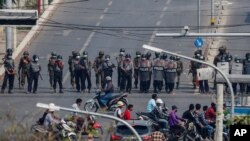A medical doctor told VOA on Saturday that Myanmar security forces stopped her from treating wounded protesters during a violent crackdown by security forces, even preventing her from caring for a protester who later died in police custody under unknown circumstances.
Dr. Aye Nyein Thu told VOA she was helping wounded protesters on the front lines in Mandalay, where security forces attacked residents during a demonstration at a shipyard last Saturday.
At least two protesters died in the mayhem, including a 17-year-old who was shot in the head and a 36-year-old who was shot in the chest and died on the way to the hospital, according to VOA’s Burmese Service.
It was among the worst violence Myanmar has seen since protests erupted following a military coup earlier this month. At least three protesters and one policeman have died in the nationwide protests, which show no signs of slowing down.
Shipyard crackdown
The violence in Mandalay, Myanmar’s second-largest city, began when about 500 riot police and other security forces descended on the Yadanabon shipyard, where dock workers had joined the national civil disobedience movement against the coup.
Following a brief standoff with protesters near the dock, security forces began firing water cannons at the crowd and proceeded to use batons to beat protesters and other nearby civilians, including an elderly resident who was simply watching, according to Aye Nyein Thu.
Aye Nyein Thu, a general practitioner, said she attempted to treat injured civilians who had been detained in a police van, including a 24-year-old man who was severely bleeding from an open wound that stretched from the front to the back of the thigh.
She said she begged police to release the man so he could receive stitches to stop the severe hemorrhage.
“They denied all my requests,” she said. “All I could do was cleanse the wound, stop the bleeding, and [apply] dressing.”
Within days, the man had died while in security forces’ custody, she said.
“His family found him in the military hospital,” according to Aye Nyein Thu.
“The military doctor said the cause of death was due to COVID-19 and they immediately burned his body on that day,” she said.
“I asked the family if they were shown any evidence of COVID-19. They said they [were] only shown a blood antigen test. And this test was not checked in front of the family.”
She said she suspects the man was shot with live bullets, not rubber bullets, as security forces claim.
International condemnation
The United Nations Country Team in Myanmar expressed "profound concern" Sunday over the Mandalay violence, noting the clashes wounded dozens and left some protesters in serious condition.
"We call on security forces to refrain from violence. The use of excessive force against demonstrators by security forces must stop and the fundamental right to peaceful assembly must be respected along with other human rights such as the freedom of speech," the U.N. statement read.
The U.S. Embassy in Myanmar said it was "deeply troubled" by the fatal shooting of protesters. "No one should be harmed for exercising the right to dissent," it added.
Myanmar's military overthrew the country's elected government Feb. 1, citing irregularities in a November election. The military also jailed longtime democracy leader Aung San Suu Kyi and others. It declared a one-year state of emergency.
Public sentiment quickly coalesced against the military, which exercised brutal dominance over Myanmar for about 50 years before it eventually ceded some powers about a decade ago.
The protests have continued daily, as has the police crackdown.
Aye Nyein Thu, who spoke to VOA in between treating more wounded protesters following fresh clashes in Mandalay on Friday, said residents are not deterred by the violence.
“Not at all,” she said. “If one person dies, two [more] will come [to protest]. If two die, then a whole group will come.”




